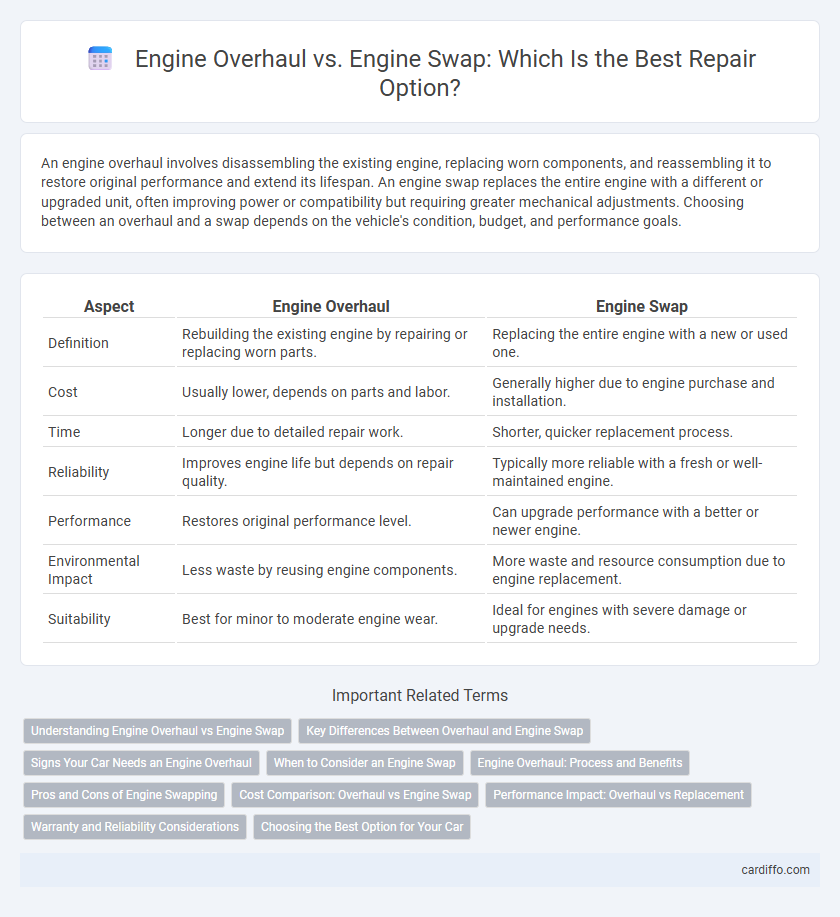An engine overhaul involves disassembling the existing engine, replacing worn components, and reassembling it to restore original performance and extend its lifespan. An engine swap replaces the entire engine with a different or upgraded unit, often improving power or compatibility but requiring greater mechanical adjustments. Choosing between an overhaul and a swap depends on the vehicle's condition, budget, and performance goals.
Table of Comparison
| Aspect | Engine Overhaul | Engine Swap |
|---|---|---|
| Definition | Rebuilding the existing engine by repairing or replacing worn parts. | Replacing the entire engine with a new or used one. |
| Cost | Usually lower, depends on parts and labor. | Generally higher due to engine purchase and installation. |
| Time | Longer due to detailed repair work. | Shorter, quicker replacement process. |
| Reliability | Improves engine life but depends on repair quality. | Typically more reliable with a fresh or well-maintained engine. |
| Performance | Restores original performance level. | Can upgrade performance with a better or newer engine. |
| Environmental Impact | Less waste by reusing engine components. | More waste and resource consumption due to engine replacement. |
| Suitability | Best for minor to moderate engine wear. | Ideal for engines with severe damage or upgrade needs. |
Understanding Engine Overhaul vs Engine Swap
Engine overhaul involves disassembling, cleaning, repairing, and reassembling the existing engine to restore its performance and extend its lifespan, typically costing less than a complete replacement. An engine swap replaces the entire engine with a new, rebuilt, or different model engine, offering improved performance or compatibility but often incurring higher expenses and complexity. Understanding the differences helps vehicle owners make informed decisions based on budget, desired performance, and long-term reliability.
Key Differences Between Overhaul and Engine Swap
An engine overhaul involves disassembling, cleaning, inspecting, and replacing worn parts to restore the engine's original performance, while an engine swap replaces the entire engine with a new or refurbished unit. Overhauls typically extend the engine's lifespan without altering vehicle compatibility, whereas swaps can offer significant performance upgrades or compatibility changes but require more labor and cost. The decision between overhaul and swap depends on factors like engine condition, budget, desired performance, and vehicle model compatibility.
Signs Your Car Needs an Engine Overhaul
Visible smoke from the exhaust, unusual knocking sounds, and excessive oil consumption are clear signs your car needs an engine overhaul. Reduced engine performance, frequent stalling, and difficulty starting the vehicle also indicate internal engine wear requiring comprehensive repair. Timely engine overhaul restores compression, improves fuel efficiency, and prevents costly engine replacement like an engine swap.
When to Consider an Engine Swap
An engine swap is advisable when the existing engine suffers from catastrophic failure or extensive wear beyond economical repair, especially if replacement parts are scarce or prohibitively expensive. This option is beneficial for high-mileage vehicles where an overhaul might not restore optimal performance or reliability. Additionally, swapping in a more powerful or modern engine can enhance vehicle performance, making it a practical choice for upgrades or customized applications.
Engine Overhaul: Process and Benefits
Engine overhaul involves disassembling the engine, inspecting, cleaning, and replacing worn components to restore optimal performance and extend engine life. This process enhances fuel efficiency, reduces emissions, and can be more cost-effective than a complete engine swap. Maintaining the original engine preserves vehicle value and ensures compatibility with existing systems.
Pros and Cons of Engine Swapping
Engine swapping offers the advantage of significantly reducing repair time by replacing the entire engine with a functioning unit, which can restore vehicle performance quickly and sometimes enhance power output if a higher-spec engine is installed. However, engine swaps may introduce compatibility issues, such as mismatched electronics, transmission incompatibility, or emissions compliance problems, potentially leading to costly modifications and legal challenges. While engine overhauls rebuild the existing engine components to extend longevity, engine swaps typically provide a more straightforward solution for engines with severe damage but require careful consideration of fitment, wiring, and regulatory constraints.
Cost Comparison: Overhaul vs Engine Swap
Engine overhaul typically costs between $2,500 and $4,000, involving labor and parts to rebuild the existing engine for extended use. An engine swap, often ranging from $3,000 to $7,000 or more, requires purchasing a replacement engine and labor to install it, making it a costlier option upfront. Choosing between overhaul and swap depends on engine condition, budget constraints, and long-term reliability expectations.
Performance Impact: Overhaul vs Replacement
Engine overhaul restores original performance by refurbishing components like pistons, valves, and bearings, improving fuel efficiency and power consistency while maintaining vehicle value. Engine swap replaces the entire unit, often yielding immediate performance gains through upgraded or different engine models but may affect compatibility and resale value. Choosing between overhaul and replacement depends on desired performance outcomes, budget, and long-term vehicle reliability.
Warranty and Reliability Considerations
Engine overhaul often comes with a limited warranty typically ranging from 12 to 36 months, reflecting repairs to existing components and ensuring reliability if performed by certified technicians. An engine swap usually includes a more comprehensive warranty, sometimes up to 5 years or 100,000 miles, because it involves installing a rebuilt or new engine, offering enhanced reliability and peace of mind. Choosing between an overhaul and a swap depends on factors like warranty coverage, long-term performance expectations, and the specific condition of the original engine.
Choosing the Best Option for Your Car
Engine overhaul preserves the original engine by rebuilding key components to restore performance and extend lifespan, making it ideal for maintaining a car's authenticity and value. Engine swap involves replacing the entire engine with a new or different one, often providing increased power or compatibility with modern technology. Selecting between an overhaul and a swap depends on factors such as budget, vehicle age, desired performance, and long-term maintenance goals.
Engine overhaul vs engine swap Infographic

 cardiffo.com
cardiffo.com